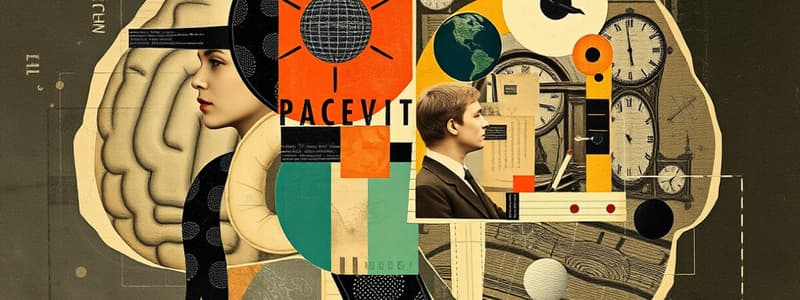Podcast
Questions and Answers
What does the term 'action' refer to within the described activity structure?
What does the term 'action' refer to within the described activity structure?
- The result of the subject after completing the activity
- The resources utilized to achieve a goal
- The conscious planning of an activity
- The interactive process between the subject and the object (correct)
What is the expected outcome referred to as 'result' in the context of activity?
What is the expected outcome referred to as 'result' in the context of activity?
- A formal recognition of the achievement
- A decrease in resource utilization over time
- Emotional fulfillment from completing tasks
- Knowledge gained from experience and practice (correct)
How does labour contribute to human development?
How does labour contribute to human development?
- It combines knowledge and practice to create value. (correct)
- It enhances social skills through collaboration.
- It limits creativity by enforcing strict tasks.
- It focuses solely on the production of goods.
Flashcards are hidden until you start studying
Study Notes
Key Concepts of Activity
- Activity represents a dynamic interaction of individuals with their environment, encompassing both psychic (inner) and physical (outer) aspects.
- Activity is characterized by its outcome, which forms the individual's attitude towards the surrounding world.
Main Types of Activity in Psychology
-
Play Activity
- Serves as a reflection of an individual's perspective on reality.
- Facilitates self-discovery and understanding of others through environmental engagement.
- Evolves through various stages aligned with age and mental development:
- Subject play: Interaction with objects and understanding their functions.
- Role play: Assuming adult roles and engaging in simulated interactions; fosters social skills.
- Playing by the rules: Adhering to specific game regulations, teaching discipline and order.
- Play is essential for children’s development, providing foundational skills for future activities.
-
Learning Activity
- Focuses on acquiring knowledge, skills, and abilities, distinguished from play by its structured approach.
- Typically includes tasks such as completing assignments, lesson preparation, and upholding discipline.
- Develops responsibility and encompasses:
- Assimilation of essential world properties for effective practical engagement (yielding knowledge).
- Mastery of techniques and operations within various activities (leading to skill development).
- Application of acquired information to make informed choices and wield control over actions (resulting in practical experience).
-
Labor Activity
- Directed towards creating both material and intangible values, fundamental to human development.
- Involves transforming ideas, knowledge, and skills into tangible products or outcomes.
Structure of Activity
- Subject: The acting individual or entity (human, animal, group, or institution).
- Object: The focus of the activity, including nature, society, or human interactions.
- Goal: A deliberate vision of the desired outcome, guiding actions and decisions.
- Resources: Tools and materials available in the environment to aid in achieving goals, including:
- Labor tools and materials
- Technology, e-applications, and online resources
- Educational materials such as books and lecture notes
- Support from peers, teachers, and academic literature.
Action and Result
- Action: The interactive process between the subject and the object driving the activity.
- Result: The acquired knowledge and practical experience gained after completing the activity, contributing to the subject's growth and development.
Studying That Suits You
Use AI to generate personalized quizzes and flashcards to suit your learning preferences.




